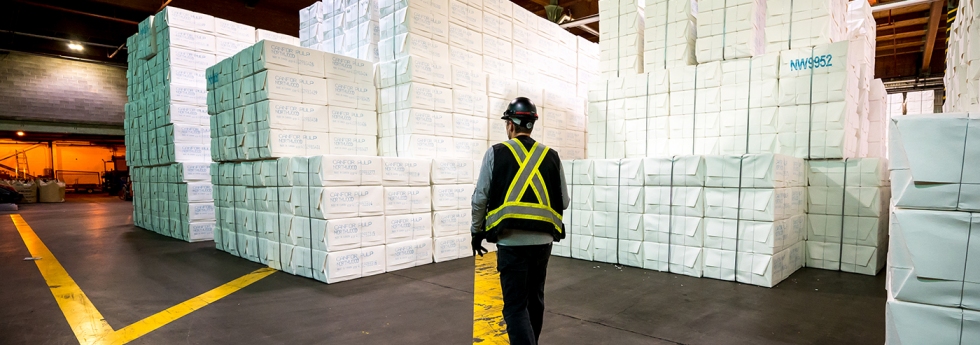|

Canfor Pulp Reports Results for the First Quarter of 2025
May 8, 2025 - Canfor Pulp Products today reported its first quarter of 2025 results.
Overview
Q1 2025 operating income of $11 million; net income of $6 million, or $0.09 per share.
Market fundamentals saw modest improvement early in the quarter; however, this momentum weakened later in the period with rising global economic and trade uncertainty.
6% increase in pulp production during Q1 2025 (versus Q4 2024) primarily due to improved operating reliability.
Financial Results
The Company reported an operating income of $10.8 million for the first quarter of 2025, compared to $4.1 million for the fourth quarter of 2024. These results were largely driven by a modest uplift in the Company's average Northern Bleached Softwood Kraft ("NBSK") pulp unit sales realizations in the current quarter combined with a 6% increase in pulp production compared to the fourth quarter of 2024.
CEO Comments
Commenting on the Company's first quarter results, CPPI's President and Chief Executive Officer, Stephen Mackie, said, "With improved operational performance and some positive momentum in market conditions early in 2025, we are pleased to see another quarter of positive results for our pulp business.
“Despite the increase in results, however, global economic uncertainty influenced pulp market conditions in the latter part of the first quarter and continues to do so early in the second quarter. Going forward, we will work to navigate these external challenges facing our business while focusing on improving safety, reliability and overall operating performance."
First Quarter Highlights
Global softwood pulp market fundamentals experienced some positive improvement during the first quarter of 2025, with modest strength observed early in the quarter, particularly in China, as global pulp producer inventory levels began to stabilize. As the quarter progressed, however, this momentum diminished as global economic and trade uncertainty rose. As a result, US-dollar NBSK list prices to China, the world's largest pulp consumer, started the year at US$770 per tonne and saw a modest increase through the current period, ending March at US$798 per tonne. For the current quarter overall, US-dollar NBSK pulp list prices to China averaged US$793 per tonne, up US$26 per tonne, or 3%, from the prior quarter.
As a result, the Company's average NBSK pulp unit sales realizations experienced a modest increase compared to the previous quarter, principally reflecting this improvement in US-dollar NBSK pulp list prices to China, coupled with a 2 cent, or 3%, weaker Canadian dollar in the current period, offset to a degree, by an unfavourable timing lag in shipments versus orders.
Pulp production was 104,000 tonnes for the first quarter of 2025, up 6,000 tonnes, or 6%, from the fourth quarter of 2024, primarily driven by improved operational reliability and productivity at both of the Company's pulp mills in the current period.
Operating income in the Company's paper segment was $5.4 million, compared to $5.1 million in the previous quarter, largely driven by the benefit of favourable timing of shipments around quarter-end as well as the weaker Canadian dollar in the current period.
Outlook
While global pulp demand and pulp producer inventory levels are currently stable, looking ahead, global softwood pulp markets are anticipated to remain subdued as increasing uncertainty associated with economic concerns and potential trade disruptions weigh on market conditions.
While the Company continues to monitor the trade situation between Canada and the US and is prepared with mitigation plans to mostly offset the impact should tariffs on US shipments be imposed, the Company is also monitoring the broader global trade situation. With its high quality, specialty product offering and market diversification, the Company is positioned to respond to any potential tariffs.
The Company remains focused on optimizing its operating footprint, enhancing operational reliability as well as closely managing manufacturing and fibre costs.
Looking forward, there remains significant uncertainty with regards to the availability of economically viable fibre within BC. As a result, the Company continues to anticipate that escalating log cost pressures and transportation costs in BC will translate into a higher cost fibre supply for its pulp mills (both for sawmill residual chips and whole log chips). The Company will continue to evaluate operating conditions and adjust operating rates at its pulp mills to align with economically viable fibre supply. These factors could also affect the Company's operating plan, liquidity, cash flows and the valuation of long-lived assets.
The relatively muted North American demand for bleached kraft paper experienced at the end of the first quarter is projected to continue through the second quarter of 2025, largely as a result of uncertainty surrounding the trade situation between Canada and the US and the potential for tariffs on US shipments.
No major maintenance outages are planned at the Company's pulp mills or at its paper machine for the second quarter of 2025.
Looking forward, the Company has revised its maintenance schedule for the second half of 2025. A maintenance outage is now scheduled in the third quarter of 2025 at the Company's Intercon Pulp mill and at its Paper machine. This maintenance outage is projected to reduce both NBSK market pulp production and paper production by 2,000 tonnes each. In the fourth quarter of 2025, a maintenance outage is now scheduled at the Company's Northwood Pulp mill which is projected to reduce NBSK market pulp production by 10,000 tonnes.
Canfor Pulp Products Inc. is a leading global supplier of pulp and paper products with operations in the northern interior of British Columbia ("BC"). Canfor Pulp operates two mills in Prince George, BC with a total capacity of 780,000 tonnes of Premium Reinforcing Northern Bleached Softwood Kraft ("NBSK") pulp and 140,000 tonnes of kraft paper.
SOURCE: Canfor Pulp Products Inc. |